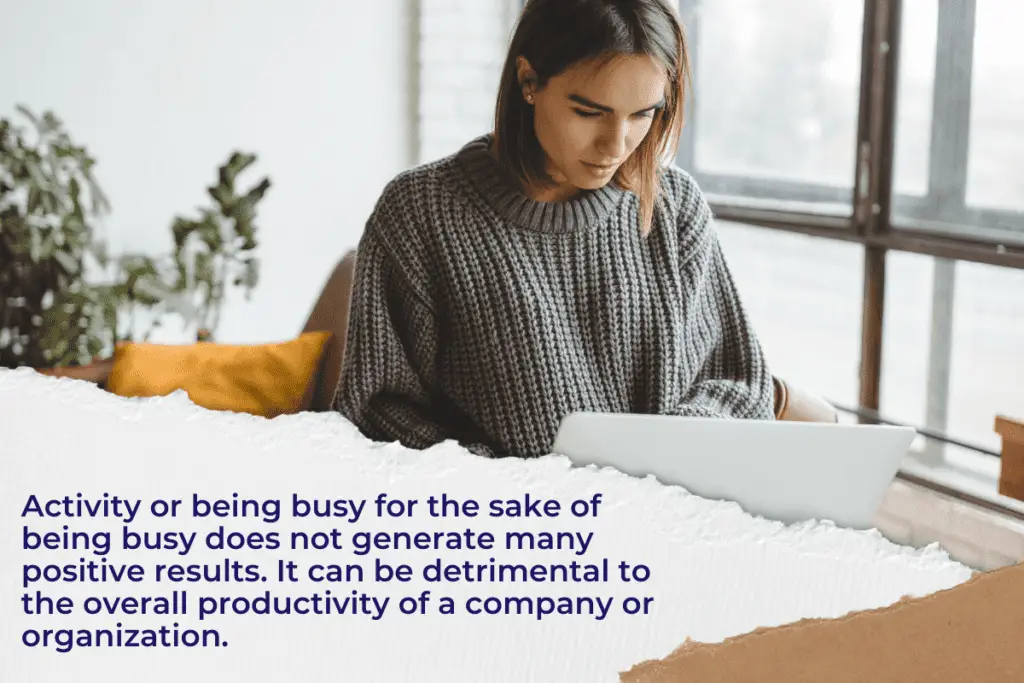So often think that because we are busy, we are being productive. We may find that we are busy for the sake of being busy.
Being busy or having a lot of activities and things to do is not the same thing as productivity. Productivity is when you do those activities and things that help you focus on the company’s growth. Busyness or being busy is not the same thing as being productive.
Table of Contents
- Being Busy Does Not Mean Productivity
- Getting ”Things Done” Does Not Build An Organization
- Busyness Can Strifle Creativity
- Busyness Can Cause Us To React
- Focusing On Over Activity Does Not Foster Change
- Break The Cycle of Busyness
- You Need To Work Smarter, Not Harder
- 10 Compelling Reasons Why Productivity Is Paramount in Life and Work
- Frequently Asked Questions
- Related Content
Being Busy Does Not Mean Productivity
Your organization can find that you are extremely busy. You may find that your staff says they are constantly busy and there is not much more they need to do but do not have the time.
We may feel we are busy just for the sake of being busy. Being busy makes us feel like we are accomplishing something, but we may not accomplish anything.
When a team leader is engaged in a kind of busyness or looks busy for the sake of it, then the other team members usually follow suit. They may feel they need to find things to do and look busy.
But many of these activities may be a complete and total waste of time. People are looking to be and keep busy just to be busy, not because it is the most productive.

Activity or being busy for the sake of being busy does not generate many positive results. It can be detrimental to the overall productivity of a company or organization.
Getting ”Things Done” Does Not Build An Organization
Sometimes in our busy lives, we are so busy trying to “get things done.” We have this lengthy checklist of things we need to get done, and when they are finally completed, we feel we have accomplished something.
But just getting things done in life does not mean that you are doing the activities that can help build your organization or company. Just checking things off a list without real impact or meaning does not help a company or organization grow.
Busyness Can Strifle Creativity
One of the most significant drawbacks to busyness is that it can have the unintended consequence of stifling creativity within an organization. People are so busy doing these unnecessary projects that they have no time for meaningful projects.
In extreme cases, a person’s energy can be so zapped that they have no power to be creative at the end of the day. They cannot focus on those things that matter most as they spend so much of their time on things that do not matter. Busyness cannot only stifle creativity but stifle the human spirit and ingenuity.
If you are a leader and your team constantly checks off a long to-do list, there will be no time or energy to think about creativity or other things that can help the company grow and become great.
Busyness Can Cause Us To React
When we are so busy and filled with activities that do not matter or make a difference, it will slow our ability to react to those things we need to respond to. Being in a chronic state of busyness can result in a reactionary state.
Instead of working and looking at ways to get ahead of a problem, we will constantly react to the situation. This kind of reaction does not help to foster a fundamental change or growth.
Focusing On Over Activity Does Not Foster Change
We live in a world with notable changes. As technology grows, so does the need for corporations and companies to change.
As a leader, if you are so focused on all of the busy days or activities of the day, you will not have the energy or time to focus on things that matter, important as growth and change.
In other words, all the activities and all the busyness will not allow you to reflect on your decisions or actions that could make a difference. The lack of focus can be a danger for any organization or company.
Break The Cycle of Busyness
As a leader, it can be very easy to fall into the trap of being constantly busy and filled with activity, especially busyness that makes no difference or impact on the overall company or the corporation.
If you find yourself in that kind of situation, there is help. You can break the constant cycle of busyness by trying to focus on what matters most.
You Need To Work Smarter, Not Harder
We have all heard the adage that says work smarter, not harder. There is so much truth to this saying of our learning to work smarter and not harder.

As a leader, you need to learn to work smarter, which means that you must demonstrate to those around you that you are results-driven and think strategically.
There are simple ways to do this daily: ask yourself a few simple questions each time you want to do something. If you are tempted to do an activity that you know is one of just busyness, the questions you can ask yourself are:
- Why am I doing this? Why am I asking my team to do this? What is the significance or importance of what we are doing?
- How will this action or activity make a difference to the organization? Does this contribute to the organization, or is this a task of busyness?
Actively asking yourself these questions will enable you to reflect upon the many reasons behind the activity or why you are asking someone else to do it. It will force you to think about the organization’s importance and reason, goals, and visions for the activities you are asking them to do.
Furthermore, this will help lead your team as you ask yourself these daily questions. It will show your team the importance of doing things that matter and helping the organization grow in the right direction.
If you cannot answer these questions, take that item, you were doing off your to-do list. Learn to focus and spend your time and energy, and focus on activities that matter. It will have a positive impact on the future growth of your company or organization.
Don’t confuse activity or busyness with productivity. They are not the same thing, and being busy for the sake of being busy can end up hurting your organization more than it will help it.
10 Compelling Reasons Why Productivity Is Paramount in Life and Work
The pursuit of productivity, often seen as the efficient use of time and resources, has far-reaching implications in both our personal lives and professional spheres. Here are ten reasons why cultivating productivity is indispensable:
- Achievement of Goals: Productivity directly correlates with the realization of both short-term tasks and long-term objectives. The more productive we are, the more milestones we can achieve.
- Optimal Time Utilization: Time, a finite resource, is maximized through productivity. Efficient task management ensures we get the most out of our allotted 24 hours.
- Reduced Stress Levels: We avoid the last-minute rush and associated stress by being productive. Tasks are completed on time, alleviating the pressures of procrastination.
- Increased Job Satisfaction: In a professional setting, productivity often results in a sense of accomplishment. This feeling of achievement boosts job satisfaction and overall morale.
- Financial Growth: At work, increased productivity can lead to faster business growth, potential promotions, and monetary incentives, directly impacting financial well-being.
- Enhanced Quality of Work: Productivity doesn’t just mean getting things done; it’s also about improving the quality. Efficient workflows often result in superior outputs.
- Boosted Self-esteem and Confidence: Completing tasks and meeting targets consistently enhances self-worth and confidence, fostering a positive self-image.
- Personal Growth and Development: Productivity often encourages continuous learning and refinement of skills. The commitment to being productive nurtures personal and professional evolution.
- More Free Time for Leisure and Relaxation: Being productive during designated work times means more leisure intervals. This balance ensures that burnout is kept at bay and mental health is prioritized.
- Creates a Positive Ripple Effect: Productivity in one area often spills over into others. A productive day at work can inspire organization at home, and vice versa. The habit creates a positive cycle that permeates various life facets.
Productivity is not just about checking boxes or crossing items off a list. It’s about living purposefully, achieving our dreams, and ensuring that each moment is spent contributing positively to our overall life vision.
Whether in the personal realm or the professional arena, productivity acts as the driving force propelling us towards success and contentment.toward
Listen To Our Podcast About Being Busy Does Not Mean Productivity Below or By clicking here.

If you want to see how Mondoro can help you manufacture home decor and home furnishing products – we would love to talk to you to see how we can help you.
Find out more about how Mondoro can help you create, develop, and manufacture excellent home decor and furniture products – don’t hesitate to contact me, Anita. Check out my email by clicking here or become a part of our community and join our newsletter by clicking here. Or join our community and join our newsletter by clicking here.
Mondoro gives out a FREE Lookbook to anyone interested. You can receive a copy of our latest Lookbook by clicking here.
Listen to our Podcast called Global Trade Gal. You can find it on all major podcast platforms. Try out to listen to one of our podcasts by clicking here.
Subscribe to our Mondoro Company Limited YouTube Channel filled with great videos and information by clicking here.
Frequently Asked Questions
What is the difference between being busy and being productive?
Being busy refers to having a lot of activities and things to do, while being productive means focusing on tasks that contribute to the company’s growth and achieving desired outcomes.
How can I differentiate between busyness and productivity?
Busyness often involves being occupied with various tasks without a clear purpose or impact, whereas productivity involves prioritizing and working on tasks that align with organizational goals and bring meaningful results.
Can being busy lead to productivity?
Being busy doesn’t necessarily lead to productivity. It is possible to be busy with non-essential tasks that don’t contribute significantly to achieving desired outcomes or company growth.
What are some signs of busyness without productivity?
Signs of busyness without productivity include constantly feeling overwhelmed, not making progress towards important goals, and being preoccupied with minor tasks that don’t have a significant impact on the company’s success.
How can I ensure that my busy schedule translates into productivity?
To ensure a busy schedule translates into productivity, it is crucial to prioritize tasks based on their importance and impact. Focus on activities that align with the company’s growth objectives and delegate or eliminate tasks that don’t contribute to overall success.
Why is it important to differentiate between busyness and productivity?
Differentiating between busyness and productivity helps individuals and organizations allocate time and resources effectively. It allows for a clearer focus on tasks that drive growth and enables better time management and prioritization.
Can multitasking be a sign of busyness rather than productivity?
Yes, multitasking can often be associated with busyness rather than productivity. Juggling multiple tasks simultaneously can lead to reduced focus and efficiency, resulting in subpar outcomes.
How can I become more productive and less busy?
To become more productive and less busy, start by identifying high-priority tasks that directly contribute to the company’s growth. Delegate or eliminate non-essential tasks, practice effective time management, and maintain a clear focus on achieving desired outcomes.
Related Content
What Is Meant By Production & Productivity, Their Difference Explained
Production is about manufacturing goods from raw materials to finished products. Productivity is considered part of the production process. Productivity is about how efficient a country or company is. Productivity is an economic principle; a formula is used to calculate productivity.
You can discover more by reading What Is Meant By Production & Productivity, Their Difference Explained by clicking here.
8 Reasons Productivity Makes You Happy
There are many ways that productivity can help to make you happy. Studies have shown that some of the most productive people are also the most content. Productive people accomplish things, learn new things, achieve goals, and do the other things in life that help ensure they are effective and happy. The good news is that productivity can help to make you happy.
By clicking here, you can discover more by reading 8 Reasons Productivity Makes You Happy.


